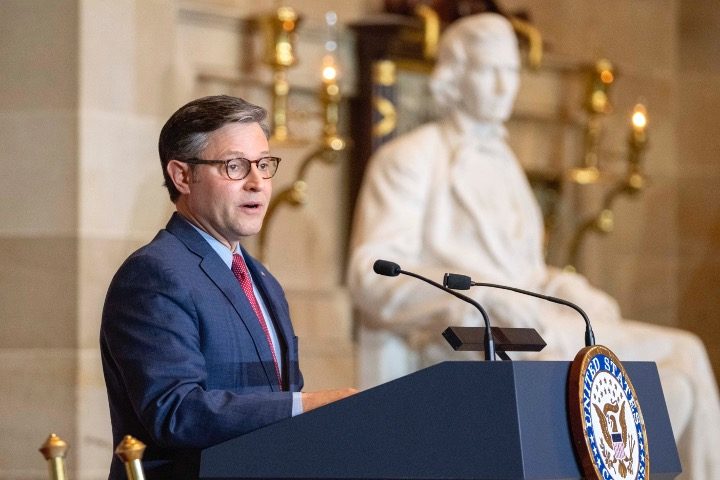
Taking a step toward avoiding a potential government shutdown in the next few weeks, House and Senate leaders on Sunday announced they had reached a $1.590 trillion top-line spending deal for government funding in 2024. The agreement is designed to allow lawmakers to now focus on approving 12 appropriations bills.
The Epoch Times reported that House Speaker Mike Johnson (R-La.) announced the agreement in a “Dear Colleague” letter sent to Republican lawmakers:
“After many weeks of dialogue and debate, we have secured hard-fought concessions to unlock the FY 24 top-line numbers and allow the Appropriations Committee to finally begin negotiating and completing the twelve annual appropriations bills,” Mr. Johnson said.
Senate Majority Leader Chuck Schumer (D-N.Y.) and House Democratic Leader Hakeem Jeffries (D-N.Y.) released a statement on the bipartisan agreement declaring, “The bipartisan topline appropriations agreement clears the way for Congress to act over the next few weeks in order to maintain important funding priorities for the American people and avoid a government shutdown.”
President Biden added his approval of the bipartisan funding deal, stating on Sunday that the agreement “moves us one step closer to preventing a needless government shutdown and protecting important national priorities.”
“It reflects the funding levels that I negotiated with both parties and signed into law last spring. It rejects deep cuts to programs hardworking families count on, and provides a path to passing full-year funding bills that deliver for the American people and are free of any extreme policies,” he said in a statement.
According to The Hill, Johnson said in his letter that the “$1.590 trillion for fiscal 2024” includes “$886 billion for defense and $704 billion for nondefense purposes.” And CNN quoted Johnson as saying that “concessions from Democrats … include ‘an additional $10 billion in cuts to the IRS mandatory funding (for a total of $20 billion), which was a key part of the Democrats’ ‘Inflation Reduction Act.’” He added that “we will cut $6.1 billion from the … Administration’s continued COVID-era slush funds, which we achieved despite fierce opposition.’”
The Democratic leadership claimed the agreement secured “$772.7 billion for non-defense discretionary funding” that protects “key domestic priorities like veterans’ benefits, health care and nutrition assistance from the draconian cuts sought by right-wing extremists,” and added that they “made clear to Speaker Mike Johnson that Democrats will not support including poison pill policy changes in any of the twelve appropriations bills put before the Congress.”
The agreement faces a challenge from Republicans seeking fiscal responsibility in government spending, which may force Johnson to court Democratic representatives to pass the appropriations bills.
The House Freedom Caucus, which opposes the agreement, posted on X, “It’s even worse than we thought. Don’t believe the spin. Once you break through typical Washington math, the true total programmatic spending level is $1.658 trillion — not $1.59 trillion. This is total failure.”
It will be interesting to see if the spending deal helps avert a government shutdown as the House returns to Capitol Hill on January 9, leaving just eight legislative days to reach an agreement.
According to Bloomberg, a shutdown is still quite possible, as some conservative lawmakers “are pushing Johnson to use the shutdown deadline to force Biden to accept changes in border policy. But until now, Republican leaders have called for dealing with the border issue as part of a separate request by Biden for some $61 billion in aid to Ukraine.”
Considering the ongoing rhetoric over the possibility of a shutdown, one thing is clear — the next two weeks of debate in the House will be contentious. Biden stated on Sunday, “Now, congressional Republicans must do their job, stop threatening to shut down the government, and fulfill their basic responsibility to fund critical domestic and national security priorities, including my supplemental request. It’s time for them to act.”




